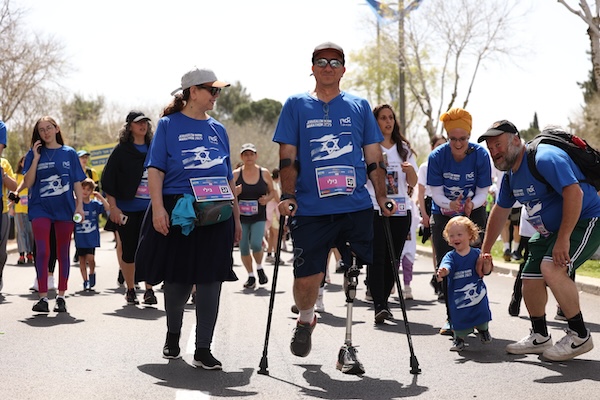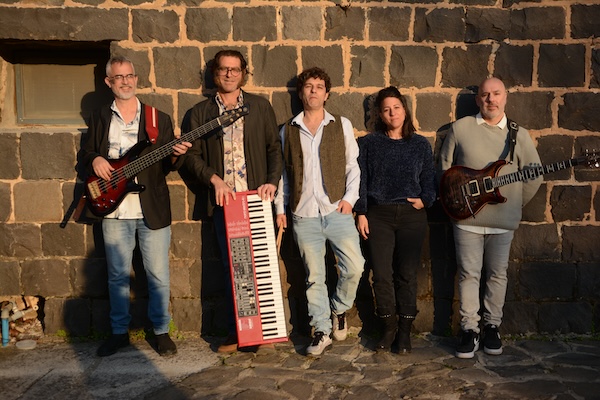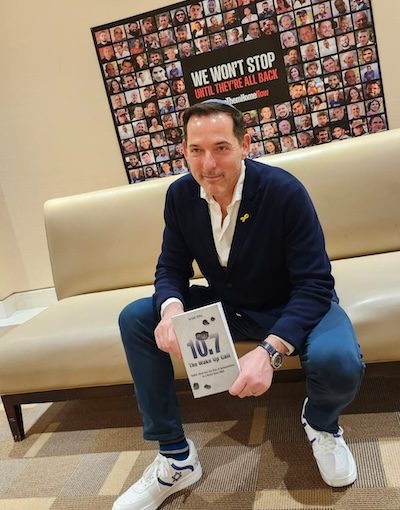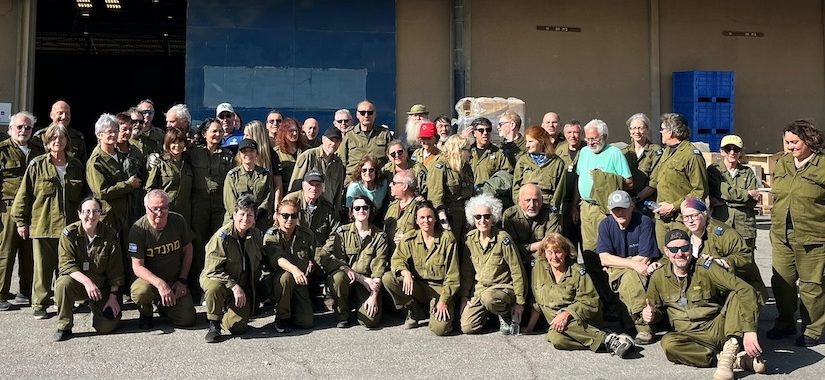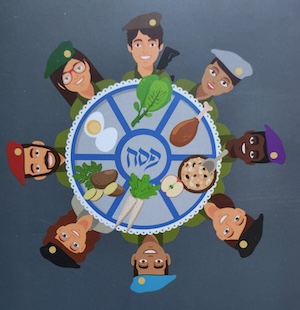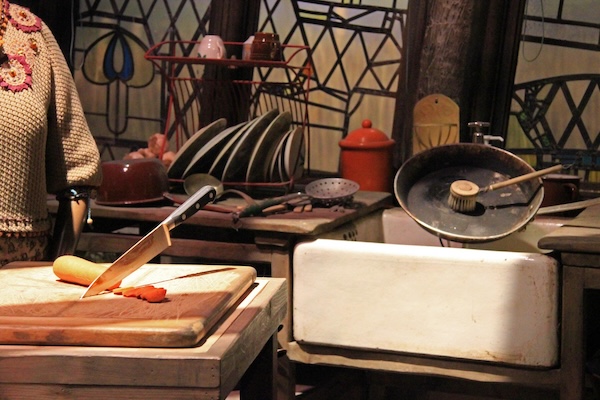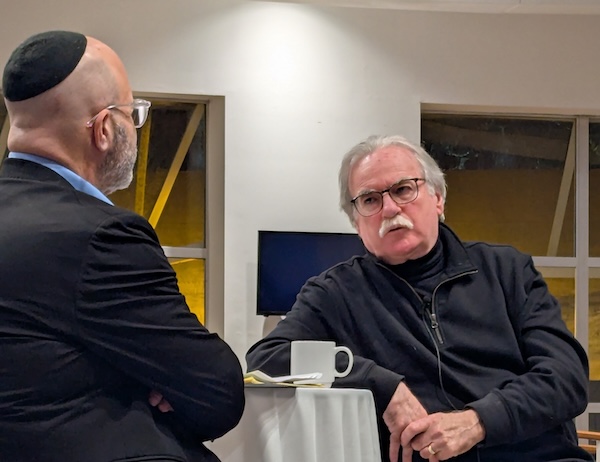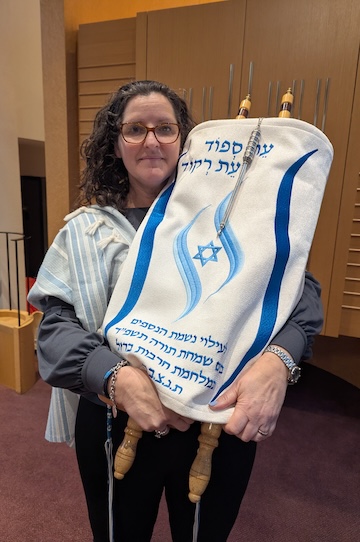Terry Glavin, right, in conversation with Rabbi Dan Moskovitz Jan. 30, traces the evolution of anti-Israel extremism in Canada. (photo by Pat Johnson)
At times, the world seems to be going off the rails, with Canadian activists overtly cheering on terrorists and celebrating the atrocities of Oct. 7. But Terry Glavin, a BC writer and thinker with a lifetime of experience on the ground as a journalist in the Middle East, thinks a reckoning is coming.
Speaking with Rabbi Dan Moskovitz at Temple Sholom Synagogue Jan. 30, Glavin, who says he comes from the political left, sees “a very, very disturbing and destructive phenomenon in all of the places where the left used to be.”
Part of that is a consequence of a change in global dynamics.
“Where there was once a fairly robust sort of proletariat internationalism on the left, there was something that was emerging by the ’60s and ’70s that was kind of a Third Worldist, anti-Western substitution for a genuinely progressive working-class internationalism,” he said. “That has had enormous implications in the trajectory of human history – very disturbing implications.”
The socialist or communist ideal never took hold in the West and that sent proponents seeking a spark that could catch fire.
“The working class simply didn’t take up the offer of overthrowing the state and seizing the means of production,” said Glavin, “so a lot of people on the European left went looking for a new proletariat and found it in Third World revolutionaries. Sometimes that was actually a legitimate thing to do. But, in the context of the so-called Arab world, what has often as not occurred is that bonds of solidarity would be forged with some of the most reactionary, anti-liberal, anti-progressive, theocratic, fascistic movements.”
Lacking a coherent political ideology, the movement coalesced around “anti-imperialism,” whose unifying principle was simply sharing the same enemies.
“All you have to basically do is say ‘I’m against the Americans, I’m anti-imperialist,’ and you’re in,” Glavin said.
The collapse of the Soviet Union was disorienting to the left, which then discovered the politics of anti-globalization. This created more strange bedfellows, Glavin said, because denouncing the International Monetary Fund and the World Economic Forum had once been the purview of the right.
Then, after the 9/11 terror attacks, anti-globalism took a backseat to what its adherents called an “antiwar” movement. Glavin takes exception to the term, because he said it was not an antiwar movement so much as a movement that sided with the West’s enemies in the wars in Iraq and Afghanistan.
“That’s a fairly serious charge to levy,” he said, “but organizationally and institutionally, that is actually a fact, in Canada particularly.”
A series of annual conferences in Cairo during the first decade of this century brought together global organizations including Canadian groups like Toronto Stop the War Coalition, the Canadian Peace Alliance, the Vancouver Coalition to Stop the War and others. In Cairo, they were joined by representatives of terror groups including Hezbollah, Hamas, Palestinian Islamic Jihad and the Popular Front for the Liberation of Palestine. These ostensible antiwar groups, and these decidedly violent groups, developed a program that opposed “imperialism.” And, vilified above every evil was the perceived imperialism of Zionism.
“At its very birthing, at its very centre, was anti-Zionism,” Glavin said.
While most of these Canadian activists probably self-identified as leftists, they had made common cause with the descendants of history’s most extreme right.
“We sort of imagine that there was this horrible phenomenon of Nazism that consumed millions and millions and millions of people in a world war and then we won and then it was over,” he said. “People forget that the same philosophy, the same ideology, the same antisemitic hatreds, were spreading throughout the so-called Arab world, throughout the Maghreb and the Levant, and Iran as well, in the 1920s and 1930s. It persisted.”
Glavin explained the direct line from the Nazi collaborationist Arab leaders of the 1940s and successive decades of forces in the region that translate and promulgate Mein Kampf and keep the flame of fascism alive.
Despite this seeming ideological incongruity, Canadian activists returning from Cairo found some receptive audiences for particularly Canadian reasons. Canada is a decentralized, multicultural constitutional monarchy, post-nationalistic and less driven by a cohesive patriotic impulse than some other states, according to Glavin. These fluidities caused Canadians to search for an identity.
“We needed to find a way to figure out our place in the world,” he said.
Canadians were very engaged with the creation of the United Nations, including its Declaration of Human Rights. “So, the United Nations and its protocols have always significantly informed Canadian foreign policy,” he said. “If you vest your foreign-policy principles in an institution that, without anybody noticing for some reason, became largely a function of the police-state bloc and the Organization for the Islamic Conference, you’re going to find yourself in a bit of a spot.”
This may have created fertile soil for the sorts of ideas that these activists brought back from Cairo, he said. It may also explain why “Israel Apartheid Week,” a global anti-Israel phenomenon, began at the University of Toronto and why an anti-Israel boycott movement began in Canada three years before the boycott, divestment and sanctions (BDS) movement was originated by Palestinians.
Meanwhile, as activists claimed to be advocating for peace in places like Afghanistan and Iraq, Glavin said they were instead often working at direct cross-purposes with those peoples’ self-defined interests. Such was the case, he argued, with those who opposed Canada’s engagement in Afghanistan.
“The Afghan left, the Afghan women’s movement, the Afghan student movement, Afghan intellectuals, poets, Afghan socialists, liberals, were all ‘troops in,’” he said. “All these white people in North America and Europe were all ‘troops out.’ Right away, that should tell you something. Something has been broken in the traditions of left-wing solidarity among and between working people around the world.”
Journalists Glavin knew in Afghanistan were baffled by Canadian activists.
“They would see another protest in Toronto,” he said, and they would ask: “Why would they do that to us?”
The left has to be held to account, Glavin said, naming the New Democratic Party specifically.
“Where the hell were you when this was happening? What were you saying when trade union leaders were meeting with Hezbollah, were meeting in Damascus with these blood-soaked tyrants? Where were you?” he asked. “The women of Afghanistan were begging – begging you – to stay with them, just hang on for a couple more years. [They were saying] ‘We’ve got an entire generation of young people coming up now, they’re graduating and they are going to be taking over, and you walk away from us? How could you do this?’”
All of these threads of ideological extremism came together with a particular fervour after Oct. 7, 2023, Glavin argued.
“Immediately, across this country, people were pouring into the streets celebrating the bloodiest pogrom since the time of the death camps,” he said.
This was new, Glavin noted. A couple of decades earlier, at the height of the antiwar movement, activists were not overtly championing the terrorists.
“You didn’t have hundreds and hundreds of people in the streets saying, ‘We are Al Qaeda, we support Al Qaeda, yay Al Qaeda,’” he said. “You have that now – people who are openly, enthusiastically, deliriously, hysterically praising Hamas. That’s different. Something big has changed. Something very big has happened.”
This has affected Canadian Jews severely.
“On Oct. 8, Canadian Jews just didn’t wake up to find that the fabric of the country had been kind of torn by this, but rather that something had been woven into the very fabric of the country itself,” he said.
As things have deteriorated to the point where clusters of Canadians are literally celebrating the mass murder of Jews, Glavin sees a ray of hope. By showing their true colours, these activists have made it more difficult for aware Canadians to ignore the extremism that has consumed parts of our society, including the anti-Israel left. He foresees a reckoning.
“I am optimistic,” he said, “because I do think that most normal people, on any number of fronts, have simply had enough.”

